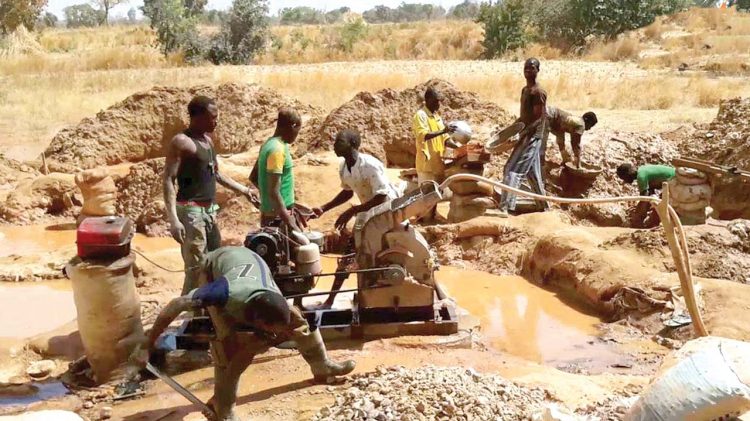When President Bola Tinubu assumed office on May 29, 2023, he promised to prioritise economic diversification.
The target is to grow the economy of Nigeria to more than one trillion dollars by the end of its first term particularly through the non-oil sector.
One of such sectors is solid minerals which analysts say has been neglected over the years, which has caused its gross underdevelopment.
The minister of solid minerals development, Mr Dele Alake, said the administration is putting in place policies and initiatives, aimed at diversifying the economy and ensuring that it generates more revenue than oil in the near future.
The solid mineral sector is expected to be one of the initiative’s pillars.
According to Alake, the federal government is working towards ensuring that the solid minerals sector is able to contribute more to the Gross Domestic Product (GDP) than the oil sector has done.
He said the move was necessary considering the global upsurge in energy transition which could reduce the oil demand.
He also stated that Nigeria possesses critical minerals for the energy transition in commercial quantities across its states.
In addition a German company, Geoscan, conducted a preliminary survey that estimates that Nigeria has 750 billion dollars worth of solid minerals yet to be unearthed.
But while Nigeria has this vast potential analysts argued that necessary steps need to be taken to harness it and ensure operators enjoy ease of doing business.
The sector has faced various challenges, particularly in illegal mining, poor infrastructure and insecurity.
These factors have combined to deprive the government of the royalties, levies and other deserved accruals.
The Solid Minerals Ministry inaugurated the Mining Marshals, a security unit designed to secure national mining sites, in March.
Additionally, efforts have been made to formalise mining operations in the sector, aimed at combating banditry.
Alake has also embarked on a campaign to market Nigeria`s solid minerals globally with a view to attracting major players to the sector and generating Foreign Direct Investment(FDI) for the country.
One of the tools deployed for the marketing is a software called the Nigerian minerals resource Decision Support System (DSS).
It was unveiled on May 14 to serve as a one-stop shop for investors seeking credible and decisive information on Nigeria’s mineral resources, facilities and infrastructure.
These efforts and many more are part of efforts to sanitise the sector, which stakeholders say have started yielding results.
However, they observed that one growing concern is state governments` interference with mining operations.
They continued to decry what they consider to be the sector’s overregulation and the multiple taxes imposed by state governments, all in an attempt to control the mineral resources in their regions.
However, the exclusive ownership and control of mineral resources are vested in the Federal Government by the Constitution of the Federal Republic of Nigeria (CFRN) and the Nigerian Minerals and Mining Act of 2007 (NMMA 2007).
Sections 1(2) and 22 of the Mining Act prioritised mining operations over other land uses, classifying them as an `overriding public interest` in accordance with the Land Use Act.
While these regulations are spelt out, analysts noted that miners continue to face interference from state governments in their operations, which has burdened their operational costs.
The national president of the Miners Association of Nigeria (MAN), Dele Ayankale, affirmed that the cost of doing business in the mining sector has increased due to state government interference.
He said that the interpretation of the laws is creating challenges for mining title holders nationwide, which could hinder efforts to attract investors.
“We all know what the constitution says about mining; it is in the exclusive list; there are provisions between local and host communities, but what we are experiencing now is a deviation from the norms.
“The state governments are setting up their own regulatory framework and structure, and all these come with their own regulatory levies, and some conditions may be difficult for the titleholders to meet.
“It also creates confusion in the sector and negates the federal government`s dedication to attracting investors.
“There is the need for government to re-enact its laws and be solely committed to address this situation and speak with one voice,” he said.
At a recent news conference, a group, the Forum of Concerned Stakeholders in the Nigerian Minerals and Mining sector decried shutdown of legal mining sites across states due to the constant interferences of state governments.
The president, Nigeria Mining and Geosciences Society(NMGS), Prof. Akinade Olatunji, said state governments obviously want control over natural resources within their territories with such actions throwing the sector into confusion.
“These actions from the sub-nationals do not only complicate the business environment for investors.
“They also introduce a huge level of unquantifiable risks capable of hindering and sabotaging the Federal Government`s vision for the accelerated investment flows in to the sector,” he said.
He listed the interferences to include the establishment of Ministries, Departments and Agencies (MDAs) by state governments, and requesting that dully signed licensed operators should register with such state-run MDAs.
He alleged confiscation of lawfully mined products from operators without reason, brutalisation of personnel of operators and, in some instances, vandalism and setting on fire of hard-earned equipment.
He also alleged that the state governments institute frivolous court cases against operators.
According to him, the conduct of the affected state governments can be partly traced to the lack of establishment or effectiveness of the States Mineral Resources and Environmental Management Committee (MIREMCOs). NAN





